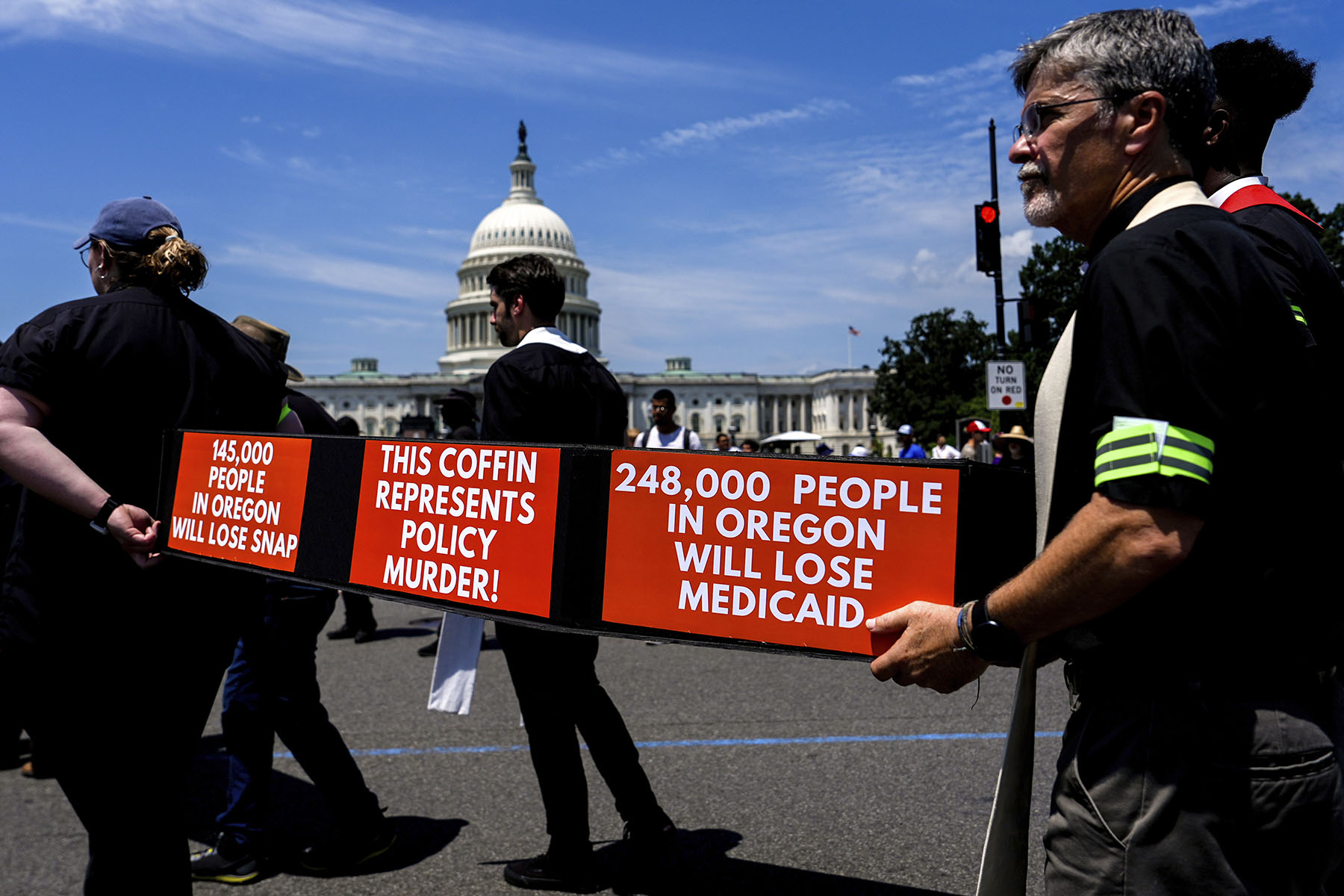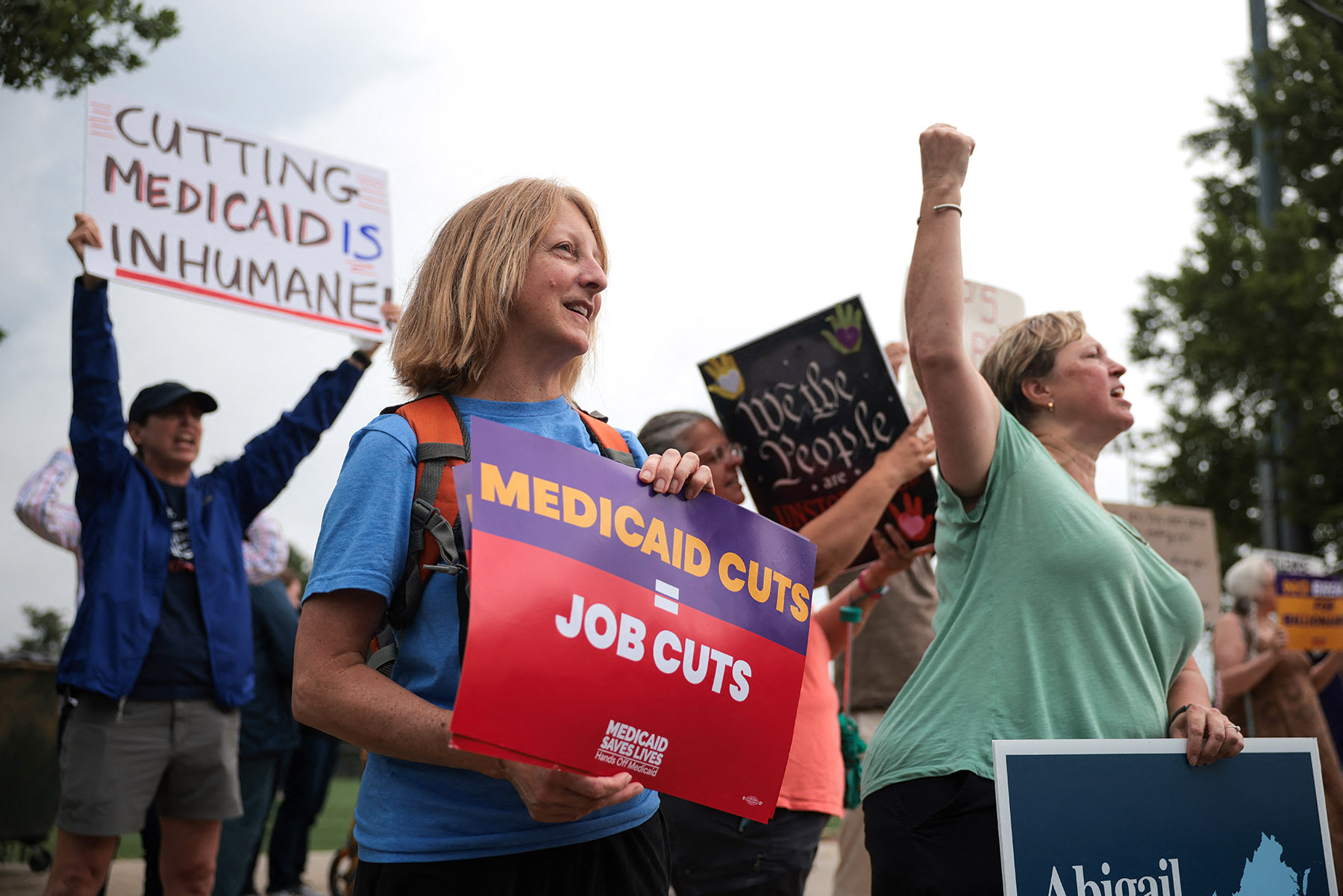Concerns expressed over wealth inequality, excessive border security, impact on healthcare, national debt

The "One Big Beautiful Bill" — President Donald Trump's proposed mega law that involves billions of dollars to implement his great plans for the United States — is poised to affect millions of lives, for both good and bad, and has attracted heated debate nationally and internationally.
Originally approved by the House of Representatives in May, and passed by a narrow Senate vote on Tuesday, the bill will go back to the House where both major parties must agree on a unified version. The administration hopes to sign the bill into law by July 4.
It covers a broad range of issues, including tax cuts, reductions in social welfare, increased funding for border security and immigration enforcement, as well as ambitious plans for space-based defense, and is projected to add trillions of dollars to the US national debt.
READ MORE: Trump's ‘big, beautiful bill’ reveals divisions in Washington
"Trump's so-called 'Big Beautiful Bill' … is the most dangerous piece of legislation in the modern history of our country. It is a gift to the billionaire class while causing massive pain for working families," said Senator Bernie Sanders, a former presidential candidate.
Democratic Senate Minority Leader Chuck Schumer said that "the bill is a big, ugly betrayal of the American people by the Republicans, and the American people will remember it."
While the bill introduces a range of tax deductions such as exempting estate taxes, raising business owner tax deduction, and offering incentive bonuses for having children, it also offers tax breaks for large corporations. It addresses the State and Local Tax deduction that offers more money back for taxpayers.
However, some analysts said Trump's bill will deliver substantial tax cuts to wealthier Americans, while offering little benefit to working class people.
According to a recent analysis by the Urban-Brookings Tax Policy Center, an individual earning $217,000 or more annually would receive an average tax cut of about $12,500. In contrast, those making $35,000 or less would receive an average cut of just $150. People earning between $460,000 and $1.1 million per year (the top 95th to 99th income percentile) would receive an average tax cut of $21,000, boosting their after-tax income by approximately 4.4 percent.

Healthcare 'weakened'
If passed, Trump's bill would end millions of US people's access to healthcare.
To qualify for Medicaid, recipients would be required to work, and face stricter eligibility scrutiny. The bill also limits the states' ability to tax medical providers to generate additional funding for the Medicaid program. In addition, it would become more difficult for individuals to enroll in and qualify for the Affordable Care Act, also known as Obamacare. Even those who do qualify are likely to face higher out-of-pocket costs.
About 83 million people are currently on Medicaid, according to KFF, a health policy research and news organization. Among those recipients, 37 percent aren't working due to various reasons, including attending school, caregiving, illness and disabilities, retirement, or inability to find work.
Even for those not on Medicaid or enrolled in Obamacare, the bill could still have an impact, experts said.
Owais Durrani, an emergency room doctor in Houston, Texas, said the bill will lead to over 55,000 preventable deaths every year. Not only because people won't be able to afford healthcare, but also because cuts to healthcare funding may lead to hospital closures, particularly in rural areas.
"These hospitals have been on the verge of tight finances for years, and this could be enough to shut them down," Jennifer Mensik Kennedy, president of the American Nurses Association, told ABC News. "If we have cuts to Medicaid, we're going to see these hospitals start to shutter their doors, and people are going to have to drive three, four hours to deliver a baby, to go have emergency care, to get seen, and that's got to be unacceptable to everyone."
However, the White House said that by "strengthening the integrity of Medicaid by eliminating waste, fraud, and abuse, its resources can be refocused on providing better care for those whom the program was designed to serve".
The bill will also take away health coverage for an abortion, further blocking access to reproductive rights, especially for low-income women. Planned Parenthood, the biggest nonprofit provider of reproductive health services in the US, called this a "sneaky attack".
"More than 90 percent of closures would occur in states where abortion is protected and legal. In 12 states alone, approximately 75 percent of abortion-providing Planned Parenthood health centers could close," it said.
Working class people will not only potentially lose access to healthcare but also food assistance, known as SNAP, with recipients having to show proof of work. One in 8 people in the US receives SNAP, with two-thirds of them children, the elderly, and people with disabilities, according to the Center on Budget and Policy Priorities.
"There's nothing beautiful about taking food away from kids and ripping healthcare from millions to give tax cuts to billionaires," said former US House speaker, Democrat Nancy Pelosi.
Sourabh Gupta, a senior fellow at the Institute for China-America Studies in Washington, said the bill's tax and spending provisions would provide a modest stimulus to medium-term growth as well as a short-term stimulus to the market. "These positives, though, are greatly outweighed by the longer-term fiscal costs and the inegalitarian distributional outcomes of the bill," he said.

Security focus
The bill provides $46.5 billion in funding for new border walls, $5 billion for US Customs and Border Protection facilities, and an additional $6.1 billion for the CBP for hiring, training, and retaining staff, and bonuses.
On Tuesday, Trump toured "Alligator Alcatraz", a new $450 million Immigration and Customs Enforcement detention center in the Everglades, Florida, designed to hold up to 5,000 detainees. Photos from the site show rows of bunk beds enclosed by wire cages.
More than 58,000 immigrants were in ICE custody as of last week, according to a CNN report. Many were detained in local jails because ICE only has funding to house about 41,000 people. Trump's bill allocates $45 billion for more detention facilities, as well as $29.8 billion for ICE's operational costs, including hiring more staff.
" (The) Big Beautiful Bill passing would make the budget for ICE larger than most of the world's militaries," said political scientist Ian Bremmer.
There's also a proposed significant budget increase for the military and national defense, with $24.4 billion allocated to expand and modernize the US naval fleet, $25.3 billion for arsenal and munitions production, $11.5 billion for military infrastructure and special forces expansion, and another $24.4 billion for air and missile defense systems.
A large portion of funding will go toward the "Golden Dome" missile defense shield system, with contractor Lockheed Martin to develop and place interceptors and sensors in space.
"Once fully constructed, the Golden Dome will be capable of intercepting missiles even if they are launched from other sides of the world and even if they are launched from space," Trump said.
Russia and China released a joint statement on May 8, opposing the Golden Dome project that read, "a nuclear war cannot be won and must never be fought".
The bill also provides $10 billion for a Mars mission, $325 million for space station de-orbiting and $85 million for the space shuttle move.

Revival of fossils
With the backing of the fossil fuel industry, the bill includes new tax breaks for coal and seeks to scale back or eliminate tax credits for wind and solar energy projects.
The bill also introduces several changes to clean energy tax incentives. To qualify for credits, most clean energy projects must begin construction within one year of the bill's enactment or be operational by the end of 2027. Nuclear, geothermal, and battery storage projects will still be eligible for full tax credits if construction begins before the end of 2033.
The bill will end tax credits for residential clean energy improvements, such as rooftop solar panels and electric heat pumps. It also eliminates the $7,500 tax credit for electric vehicles, terminates credits for wind power components after 2027, and disqualifies projects linked to any "foreign entity of concern" from receiving tax breaks.
Some experts have warned that investors may shift their capital to European Union countries and China, where clean energy remains a top priority. "Data center and AI companies will look overseas to find more reliable and affordable power sources, ceding the digital race to China," said the American Clean Power Association.
In addition, the bill wants to end the de minimis rule on all countries, an exemption that allows foreign countries to ship packages into the US tax-free if each package is valued under $800. On May 2, the Trump administration ended the exemption for packages coming from China, including the Hong Kong Special Administrative Region.
They are now subjected to 30 percent of duty taxes or $50 per item, taking a toll on companies like Temu and SHEIN. In the first week of May, FedEx said it saw a 35 percent drop in packages coming from Asia to the US.
Beginning in July 2027, all countries will be subject to the taxes. The International Mailers Advisory Group told The Wall Street Journal that ending the de minimis rules could lead to $40 billion in revenue, but it could cost the government more to collect the duties.
Deeper in debt
Trump wants to add another $3.3 trillion over a decade to the country's $36.2 trillion debt. Last year, the US government spent more on interest payments than on the entire national defense project. Since 2017, the net interest on the debt has tripled, according to US Government Accountability Office.
High national debt will lead to higher interest rates, slower economic growth, loss of fiscal flexibility, and an increased risk of a fiscal crisis and programmatic insolvency, according to the Committee for a Responsible Federal Budget.
"The US is heading in the wrong direction. This bill would be one more nail in the coffin of a country falling under an enormous debt burden," Kristina Hooper, chief market strategist at Man Group, the world's largest listed hedge fund, told CNN.
Thomas Fullerton, a professor of economics and finance at the University of Texas at El Paso, said even though the US economy is growing, the White House, similar to what it did in the previous Trump administration, is going to engage in large scale, pro-cyclical deficit spending.
"There is no reason to pile up more debt during expansionary phases of the business cycle, but that is what is going to occur, again. Interest rates will be higher than necessary and impair investment and capital accumulation," he told China Daily.
ALSO READ: Trump suggests DOGE look at Musk's companies to save money
Meanwhile, in a controversial move, Trump is targeting elite US universities by proposing a steep increase in the tax on university endowments from 1.4 percent to 20 percent.
Trump has previously stripped away billions of university research funding and taken action in response to claims of rising antisemitism on college campuses. Critics argue these actions are politically motivated attacks on higher education.
"Stripping (away) research and innovation funding to force compliance will hurt America's competitiveness and help our adversaries outpace us in technological and other advancements. America's university research and innovation centers have long been the envy of the world," said Randi Weingarten, president of the American Federation of Teachers.
Yifan Xu and Belinda Robinson contributed to this story.
Contact the writer at bilinlin@chinadailyusa.com


